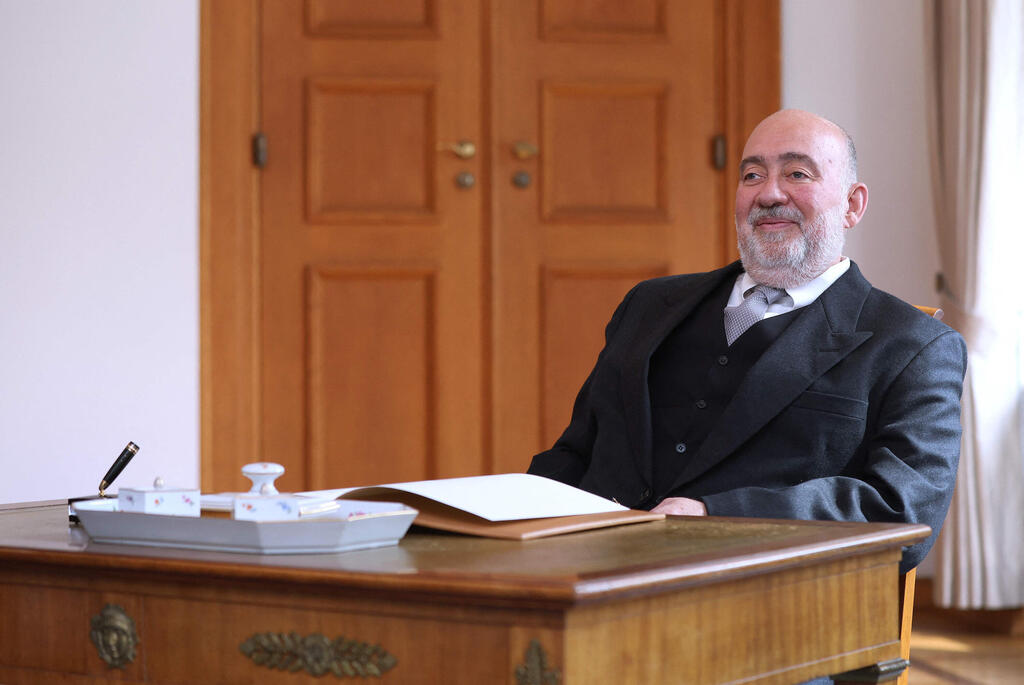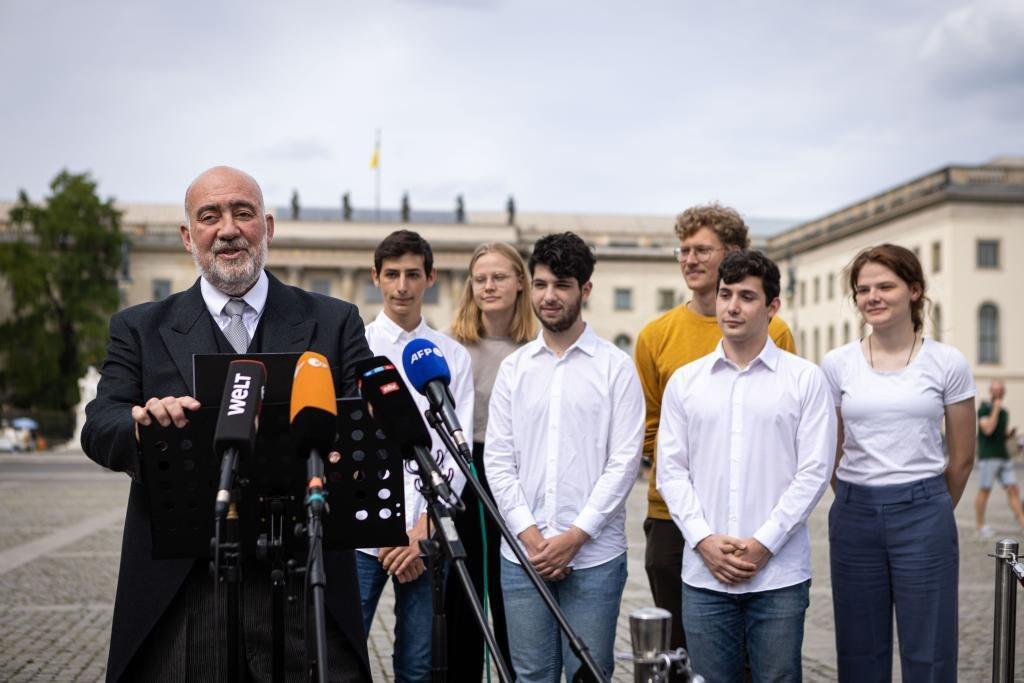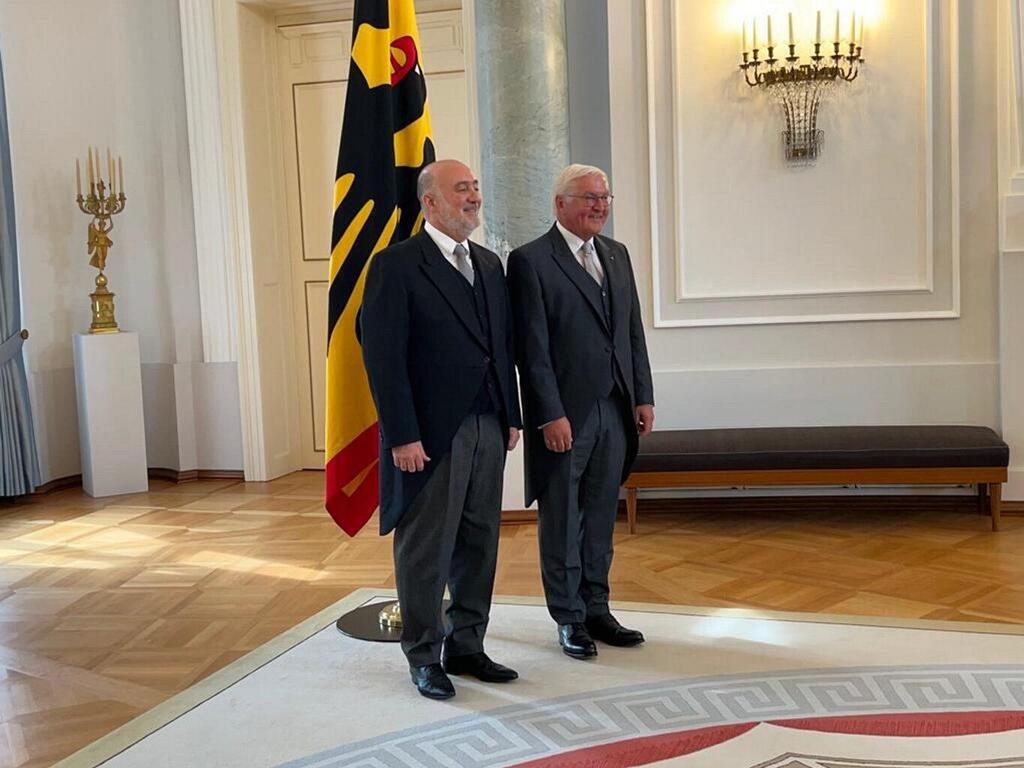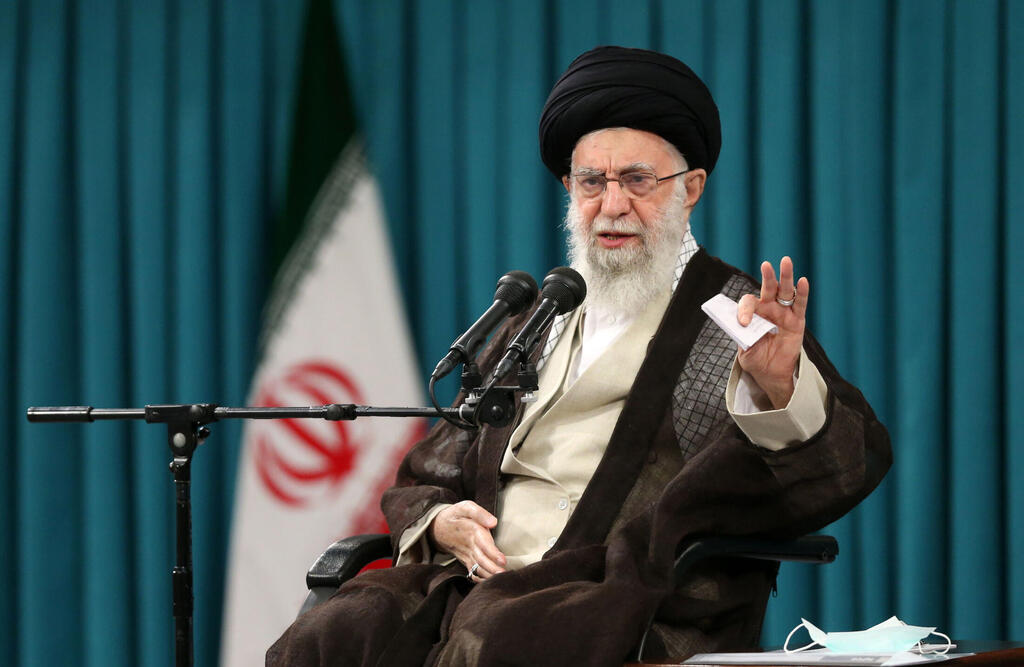Anti-Israel groups in Germany have expressed frustration over a German court that upheld a recent ban on anti-Israel demonstrations in Berlin due to their antisemitic and pro-violent messaging. The impetus for the ban? Repeated chants to destroy the state of Israel at previous demonstrations.
Other stories:
In fact, the Berlin Police denied permits multiple times for anti-Israel events in the past month, due to "antisemitic incitement of the people, glorification of violence, the conveyance of a willingness to use violence and thus to intimidation and violence.”
4 View gallery


Ambassador Ron Prosor leads one of Israel's most strategic missions globally
(Photo: AFP)
While the United States, the UK and many other Western democracies are falling short when faced with similar challenges, Germany is one of the only countries to take a bold stance against rallies that clearly call for violence against Jews, thanks to the tremendous efforts of Israel's Ambassador to Germany Ron Prosor and his team.
“When they shout, ‘Kill the Jews’ that's incitement … but you can say ‘the nation-state of the Jewish people,’ that's [considered] fine. Yet if the same person would shout that about Ukraine, he would be thrown out of a five-story building here,” said Prosor.
“We as an embassy really pushed in all the relevant places here in Berlin on the political level, to make sure that – and, by the way, with success – they won't be able to demonstrate again and shout those things,” he told Ynetnews.
Prosor’s work with the German government has helped lawmakers there in understanding, identifying, and dealing with all forms of antisemitism in Germany today, but there is no shortage of challenges.
Antisemitism in Germany in 2023
“Germany really scrutinized its past in a very aggressive way, and basically did that on all levels of society,” according to Prosor. However, “where there's a problem that is not dealt with in a serious manner… is antisemitism on the left.”
“Right-wing extremist antisemitism is quite clear: they say we're against Jews, we're against blacks, we're against LGBTQ,” and the German government is working hard to fight this hatred. They establish delegates or envoys for antisemitism in every federal state. Out of 16 federal states, they [all] have someone who is responsible for dealing with antisemitism,” Prosor said.
But the reality is more complex on the left. Prosor explained that antisemitism on the left "basically takes things from the margins and brings them to center stage so it's legitimate to debate … and it demonizes and delegitimizes not just Jews, but Israel as a state. So under the so-called cover of legitimate criticism against a democratic country, you have all this coming in and we are on the front lines nearly every day.”
As an example, Prosor referenced the Documenta art show in Berlin in August 2022, when it took seven professors to determine that a piece of “art” depicting a Jew with a hooked nose sitting on a bag of money with a kippa was indeed antisemitic. Astoundingly, the curators of this blatantly antisemitic scene weren’t disciplined, rather they were basically promoted.
4 View gallery


Ambassador Prosor with Israeli students participating in the Youth Exchange Program
(Photo: Israeli Embassy in Berlin)
In order to curb this trend, Prosor and his team have been working hard to develop initiatives that reach every sector of German society. These range from multiple partnerships with soccer teams in Germany and the Bundesliga itself to stop antisemitism in sports, to educational partnerships with TikTok to inform the next generation of Germans, to banners on Holocaust Memorial Day for every soccer game.
“We are fighting antisemitism with football fans – taking them to concentration camps, talking about the Holocaust telling them what antisemitism is,” Prosor said.
Israel's Embassy in Berlin is also building partnerships with all the major German universities to promote the adoption of the IHRA (International Holocaust Remembrance Alliance) working definition of antisemitism, to promote the youth exchange program of Germans to Israel and vice versa, and was the instigator for Lufthansa’s adoption of the definition in 2022, the first ever airline to take such a step.
The threat from Iran
But Prosor’s initiatives are not only focused on moving the needle on the rising trend of antisemitism. He is working closely with the German government on security cooperation, on curbing Iranian threats, and on supporting the people of Iran standing against the regime – something he views as not only strategic but moral.
“I think we in Israel, and not just in Israel, here in Germany, people look up to the women in Iran who basically are standing on the front lines really jeopardizing their lives. … We have to support them and we have to make sure that Europe does that [too],” he said.
While your ordinary German might not realize it, the people of Israel actually support the people of Iran, he noted.
“We have nothing against the Iranian people. We have a problem with the mullahs and the ayatollahs … we know that, under the veil, you have a very diverse society. We look at Iran as a civilization. We have huge respect for the Iranians,” Prosor said.
4 View gallery


Israel's Ambassador Ron Prosor in Berlin with German President Frank-Walter Steinmeier
(Photo: Israeli Embassy in Berlin)
When it comes to the German-Israel relationship, there is no daylight. Prosor defines “the Israel-Germany relationship as the number two strategic relation that Israel has after the U.S.” A strategic relationship that spans “all facets of culture, economy, university and research, and also military and defense cooperation.”
The ambassador is most proud, however, of the coming sale of the Arrow missile defense technology. “Just think, and I'm very proud of this, that after 75 years, the nation-state of the Jewish people would be sending the Arrow Missile Defense Program to defend Germany in Europe. Not bad for the Jews after 75 years!”
According to Prosor, Germany (and all of the European Union) is starting to understand the reality of the Islamic Republic a little better due to the current situation. Iran is "crossing all the red lines and I think there's also an acknowledgment in Europe on what the Iranians are doing,” he explained.
“Israel's position on what Iran is doing is not new. What is new, is that [before] when we said what Iran does – not just on the nuclear issue, but on human rights and on terrorism – will reach Europe, people said Israelis are exaggerating. But when Putin goes into Ukraine and you suddenly see Iranian drones, Iranian cyber attacks. Suddenly, Europe looks at it in a different way.”
It’s as of yet unclear if Europe has shifted enough to apply maximum pressure on the Islamic regime. Despite the regime’s gross human rights abuses and support for terrorism, and despite its recent abuse of humanitarian aid shipments to Syria after the massive earthquake in May, there are still some officials who are talking about a return to nuclear negotiations.
But Prosor believes that the long overdue shift in European attitudes is carrying over into the nuclear negotiations (or lack thereof) too.
“I think Europe is much more skeptical than in the past on this. They're not closing the door altogether, though…for all practical purposes the negotiations are not really taking place or continuing.”
Prosor warns about appeasement however: “The Iranians are smart enough, sophisticated enough, to understand when people talk to them in a way that puts pressure, they will understand. What has been done before by trying to appease them to find some deal, worked out exactly the opposite.”
Terrorist designation for Iran's Revolutionary Guard Corps
For many months, one of Israel’s priorities in Europe has been to promote the designation of the Islamic Revolutionary Guard Corps as a terrorist organization – a move which, despite tremendous pressure, the EU is still balking at under the claim that doing so would destroy any leverage that Europe has left to negotiate with the regime. Prosor isn’t buying it.
“They're using the same [excuse] they used with Hezbollah. It's always this issue of ‘if we do that, we won't have anyone we could talk to’ … Meanwhile, in Tehran, the Iranians are moving forward with treating their own population in a way which is indescribable,” he said.
But Prosor is not without hope: “Now, inside the EU, I think you see more and more countries that are willing to really make a decision on this. They are formally saying that they need the EU, a consensus in the EU, in order to pass it. Like always, consensus in the EU is not easy. But I can see how it's evolving here. … I think we might have a chance to see a designation, which I think for all practical purposes is the right thing to do on the Iranian issue.”
Aside from the IRGC terrorist designation, when it comes to the Iranian threat against Israel, Prosor confirmed that Germany takes it extremely seriously. While there isn’t an official response from Germany on Israel’s actions against Iranian proxies and IRGC activity in Syria, the mere fact that there is silence says everything, and are a byproduct of Germany's understanding of the threats Israel faces on a daily basis – threats that have the potential to endanger Germany as well.
“The biggest challenge is for Germany and Germans to understand that Israel is on the front line encountering phenomena that Western democracies are beginning to encounter … and it's beginning to happen,” Prosor said.
“Suddenly they understand after many years, Germany has to defend itself. It's not enough to conduct dialogue because Putin is not really interested in dialogue. So when you look at Germany now and the change in understanding that they need to defend themselves, from my point of view, this is the beginning of us in Israel trying to convey the message of ‘don't point fingers at us,’ because at the end of the day, we are on the front lines and we're doing it since the establishment of the state of Israel in 1948,” he said.
While Germany shifts to a new reality in which it recognizes self-defense is a necessity for its own safety too, Israel – with the leadership of Ambassador Ron Prosor in Berlin – will stand firmly in support and in defense of its ally in Europe.
First published: 08:24, 05.23.23



